|
|
|
Sort Order |
|
|
|
Items / Page
|
|
|
|
|
|
|
| Srl | Item |
| 1 |
ID:
073690
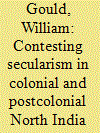

|
|
|
|
|
| Publication |
2005.
|
| Summary/Abstract |
This article re-positions debates about the apparent 'crisis' of Indian secularism in relation to political events in the important phase of state transformation between the 1930s and 1950s. By looking at how the meaning of secularism was contested by political actors themselves in Uttar Pradesh, it argues that the ideological ambiguity of Indian secularism was the product of political debates and conflicts in these critical years. It suggests further that, in the decades spanning Indian independence, the real scope and limits of secularism within the polity were determined in local and provincial contexts, as much as on the national stage. In these years, political leaders attempted to define the relationship between religious tradition and 'scientific development' by reference to specifically Indian, as well as European philosophies, traditions and histories. In particular, the many Uttar Pradesh Congress visions of Indian secularism, represented by a palimpsest of ideological positions, could not have been exclusively shaped by an overarching modernist nationalist ideology (as many scholars suggest). Much more important was the need for political leaderships to manage a rapidly changing political context, and an unprecedented expansion of demand for state power and resources in the new Indian democracy.
|
|
|
|
|
|
|
|
|
|
|
|
|
|
|
|
| 2 |
ID:
102035
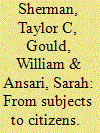

|
|
|
|
|
| Publication |
2011.
|
| Summary/Abstract |
This special issue of Modern Asian Studies explores the shift from colonial rule to independence in India and Pakistan, with the aim of unravelling the explicit meanings and relevance of 'independence' for the new citizens of India and Pakistan during the two decades after 1947. While the study of postcolonial South Asia has blossomed in recent years, this volume addresses a number of imbalances in this dynamic and highly popular field. Firstly, the histories of India and Pakistan after 1947 have come to be conceived separately, with many scholars assuming that the two states developed along divergent paths after independence. Thus, the dominant historical paradigm has been to examine either India or Pakistan in relative isolation from one another. While a handful of very recent books on the partition of the subcontinent have begun to study the two states simultaneously, very few of these new histories reach beyond the immediate concerns of partition. Of course, both countries developed out of much the same set of historical experiences. Viewing the two states in the same frame not only allows the contributors to this issue to explore common themes, it also facilitates an exploration of the powerful continuities between the pre- and post-independence periods.
|
|
|
|
|
|
|
|
|
|
|
|
|
|
|
|
| 3 |
ID:
102040
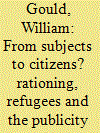

|
|
|
|
|
| Publication |
2011.
|
| Summary/Abstract |
Building on recent work on the 'everyday state' and citizenship in 1947-1948, this paper examines changing practices and representations of 'corruption' in Uttar Pradesh, India over independence. The management and publicity of 'corruption', particularly in the food supply and rationing bureaucracy from the mid-1940s to the 1960s captures changing discussions about public expectations of government and narrates everyday urban experiences of the local state. Representations of administrative corruption within UP government 'anti-corruption' planning, around the late 1930s to early 1940s, reflected changing ideas about the public and citizenship in UP in general-from a colonial stress on administrative authoritarianism, where corruption was presented as a regrettable but unavoidable facet of local power, to a sense of public accountability. By the 1940s, with war-time commodity controls accompanying rapid political change, opportunities for nefarious gain widened, and administrative rules and functions quickly became much more complex. 'Corruption', as a symbolic political weapon, was publicized in a way which now connected national, state and local level discussions of independence, citizenship and state authority. Specifically, the very nature of different types of corruption in the crucial sphere of controls and rationing brought about more developed forms of political protection and backing for the corrupt administrator and encouraged new clientelist networks across the political spectrum.
|
|
|
|
|
|
|
|
|
|
|
|
|
|
|
|
| 4 |
ID:
164046
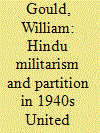

|
|
|
|
|
| Summary/Abstract |
The United Provinces and its urban centres were not in Partition’s immediate hinterland or a key subject of its high politics, but were pivotal, this paper argues, at an alternative scale of political mobilisation around volunteer movements. Central to this process were the spatial dynamics of organised violence in the early to mid 1940s, not least because of how pivotal organised killings were by 1947. By exploring the provincial patterns of the development of volunteer movements, their spatial and their inter-communal associations over time, and their ideological content (using a case study focussed on P.D. Tandon), the article argues that there were longer-term associations between organised volunteer activities and instances of pre-Partition violence that foreshadowed the large-scale attacks of the summer of 1947. This potentially affects the way historians read Partition violence as a specific ‘moment’ of communal antagonism and the significance of these movements’ ideologies of violence to India’s long Partition.
|
|
|
|
|
|
|
|
|
|
|
|
|
|
|
|
| 5 |
ID:
062514
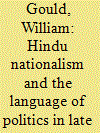

|
|
|
|
|
| Publication |
Cambridge, Cambridge University Press, 2005.
|
| Description |
xv, 302p.
|
| Series |
Cambridge studies in Indian history and soiety
|
| Standard Number |
8175962518
|
|
|
|
|
|
|
|
|
|
|
|
Copies: C:1/I:0,R:0,Q:0
Circulation
| Accession# | Call# | Current Location | Status | Policy | Location |
| 049720 | 320.54095409041/GOU 049720 | Main | On Shelf | General | |
|
|
|
|
| 6 |
ID:
152349
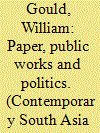

|
|
|
|
|
| Summary/Abstract |
In moving away from older linear narratives around the costs and benefits of ‘corruption’ to development and democratic processes, social scientists have tended to downplay temporality in their work on the phenomenon in the global South. Historical research, however, offers a different kind of nuance around moments in which corruption becomes important in political and administrative discourse. Examining archives on corruption in detail and comparatively poses different questions about the operation of the everyday state. It also provides alternative means for exploring the nature of citizenship, national belonging in India and how the disempowered are often unevenly affected by corrupt acts. Using two case studies in the Public Works Department during state transition in the late 1940s and early 1950s, in India’s most populous state, Uttar Pradesh, this article examines how archives convey multiple and contingent meanings to early postcolonial discourses of ‘corruption’. Such archives present the phenomenon as a vehicle or symbolic resource for larger political processes over the period. This potentially challenges our perspective on some of the larger questions surrounding the early postcolonial state, the nature of civil/political society in that period for India, ideas of national belonging and the relationship between India and Pakistan.
|
|
|
|
|
|
|
|
|
|
|
|
|
|
|
|
| 7 |
ID:
172005
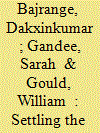

|
|
|
|
|
| Summary/Abstract |
This article explores the politics of civic engagement during India's long decolonization between 1938 and 1952 for communities—the erstwhile ‘criminal tribes’—whose lifestyles were complicated by controls on their movement before and shortly following India's independence. It argues that their varied and contingent strategies of mobilization increasingly identified community particularities—notably, their marking as ‘criminals’ and a history of movement—as a basis for negotiating their problematic inclusion within the evolving citizenship frameworks of the late colonial, then post-colonial, state. These early forms of civic consciousness set the parameters for later strategies that sought to mobilize communities by engaging with ‘universal’, ‘differentiated’, and indigenized conceptions of civic responsibility and rights. The most surprising finding of this research is that these strategies (via anti-colonialism) often embraced and celebrated forms of illegality and criminality. The romanticism of the dacoit (bandit)-cum-freedom fighter charged Dhaku Sultan-like figures with political heroism. In the context of independence and the founding of the Constitution, strategies turned to the (un)realized promises of freedom and citizenship rights. The final part of the article turns to the implications of ‘denotification’ for the so-called criminal tribes in the early 1950s, which provided both obstacles and avenues to strategies of mobilization after independence.
|
|
|
|
|
|
|
|
|
|
|
|
|
|
|
|
| 8 |
ID:
164042
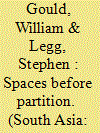

|
|
|
|
|
| Summary/Abstract |
This introduction frames a selection of papers that encourage a richer spatial understanding of the years before the Partition of India. The papers respond to two types of questions. One type is spatial (at what scale do we approach Partition? Through which spaces should we attempt to understand both micro and macro processes? Movements across what distances constituted Partition?). The second type is temporal (what timescales do we invoke when approaching Partition? Of what was it the endpoint? What sort of memories were invoked and made during India’s multiple partitions?). This introduction establishes the main trends in Partition historiography, tracked through the last two decennial anniversaries. It sketches out spatial analyses of Partition to date, regarding territory and displacement especially, but shows that much of this geographical interpretation has been implicit rather than explicit, and that most have begun with Partition. Whilst framing many of their arguments in twentieth-century colonial practice, and occasionally straying into the post-colonial, the papers in this special issue mostly focus on the 1930s–1940s at a range of scales (from the international, through the nation-state, to cities, mohallas and courtrooms). Collectively they make the argument that if Partition has a history, then it also has an historical geography. We hope these papers will help people read these histories and geographies with a finer spatial eye.
|
|
|
|
|
|
|
|
|
|
|
|
|
|
|
|
| 9 |
ID:
067185
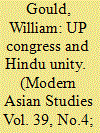

|
|
|
|
|
|
|
|